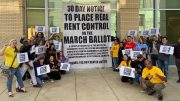This month comes a yearly ritual: the Sacramento City Council holds budget hearings and a parade of interest groups seek more money—the arts, fire, parks, police, youth programs, the list goes on and on.
What often doesn’t get talked about nearly enough are the costs of pensions and health care for former firefighters, police officers and other city retirees. These costs—along with the next recession that may be overdue—are the storm clouds gathering on an otherwise sunny financial outlook for City Hall.
So it’s a little ironic that a huge cash windfall—from the Measure U half-cent sales tax increase approved by voters last November—will spotlight the issue of pensions and other retiree costs.
In City Manager Howard Chan’s proposed budget, revenues are rising by $79 million, or 15%, for 2019-20 over 2018-19, mostly thanks to the additional $50 million from Measure U. But spending is increasing by $53 million, mostly due to higher salary and pension costs.
To keep his campaign promise that the new Measure U money wouldn’t go to pensions and salaries, Mayor Darrell Steinberg is calling for the $50 million to be spent on neighborhood and business projects to improve “economic equity”—an issue that resurfaced after the police killing of Stephon Clark.
But some council members say taking that money out of the general fund will make it much more difficult to meet the city’s pension obligations. The city’s payments to CalPERS are projected to increase to $131 million in 2024-25 from $64 million in 2017-18.
Also like other California cities, Sacramento is on the hook for retiree health care, even though it eliminated the benefit for all new hires except firefighters by 2014. The long-term liability is estimated at $429 million; the proposed budget includes more than $1 million to pay down that amount.
Before I get angry messages from city retirees, let me make a few things clear: I realize that salaries for government work are generally lower and that pension benefits offset that difference. I also know that under current law, pension benefits that exist when an employee starts working cannot be cut without additional compensation.
I’m just saying what city officials also are—that the increasing costs of retiree benefits are unsustainable and that the city can’t absorb them by itself.
Whether workers pay a bigger share depends on closed-door contract negotiations with unions. City Hall is still working with the firefighters union on a new deal to replace one that expired in December; the agreements with police officers and other major unions end on June 21. Those additional labor costs are not factored into the budget forecast.
With so much money at stake, you can’t ignore the political power of city unions. Steinberg and Councilmen Allen Warren, Steve Hansen, Eric Guerra and Larry Carr are up for re-election in March 2020.
Council members plan to hold its first public hearing on the proposed budget on Tuesday, May 14 and approve it on June 11. This year, they need to be brutally honest with taxpayers about rising retiree costs and the difficult choices that lie ahead.






Be the first to comment on "Editor’s note: Pension politics"